大学英语翻译教程-第六讲
- 格式:ppt
- 大小:1.33 MB
- 文档页数:55
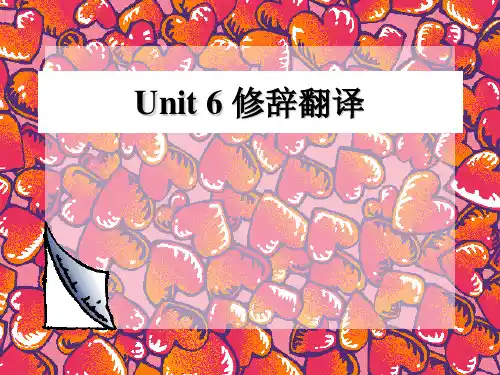
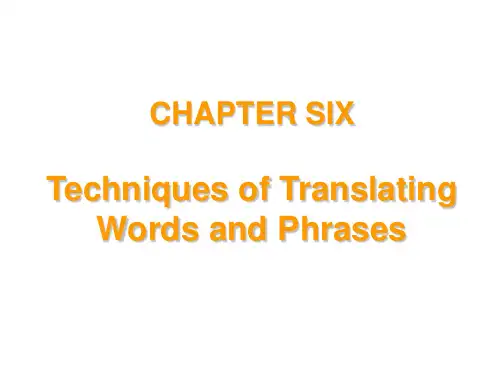
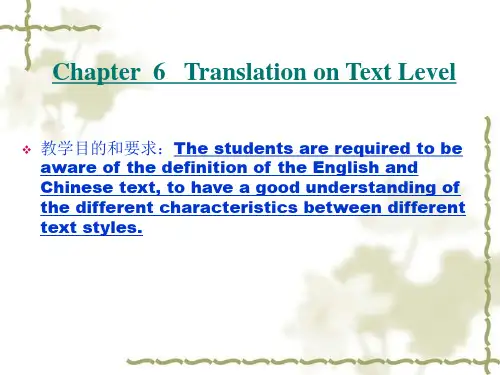
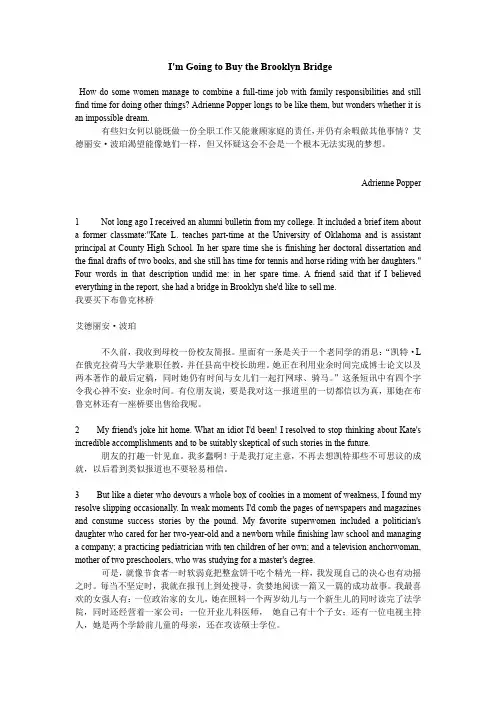
I'm Going to Buy the Brooklyn BridgeHow do some women manage to combine a full-time job with family responsibilities and still find time for doing other things? Adrienne Popper longs to be like them, but wonders whether it is an impossible dream.有些妇女何以能既做一份全职工作又能兼顾家庭的责任,并仍有余暇做其他事情?艾德丽安·波珀渴望能像她们一样,但又怀疑这会不会是一个根本无法实现的梦想。
Adrienne Popper1 Not long ago I received an alumni bulletin from my college. It included a brief item abouta former classmate:"Kate L. teaches part-time at the University of Oklahoma and is assistant principal at County High School. In her spare time she is finishing her doctoral dissertation and the final drafts of two books, and she still has time for tennis and horse riding with her daughters." Four words in that description undid me: in her spare time. A friend said that if I believed everything in the report, she had a bridge in Brooklyn she'd like to sell me.我要买下布鲁克林桥艾德丽安·波珀不久前,我收到母校一份校友简报。
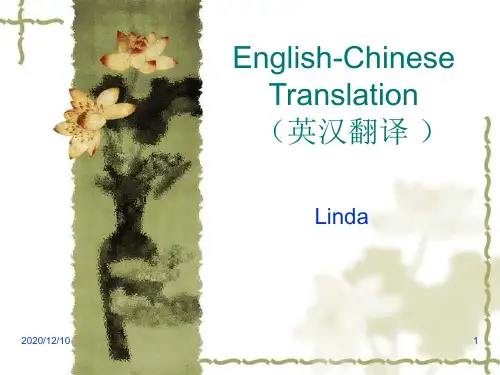
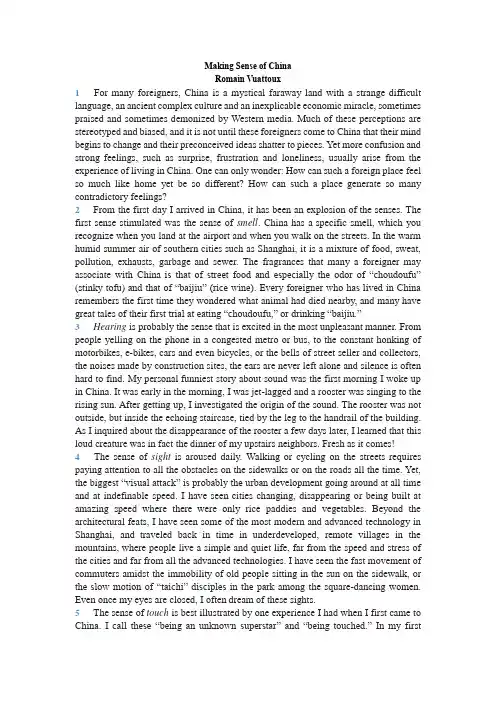
Making Sense of ChinaRomain Vuattoux1 For many foreigners, China is a mystical faraway land with a strange difficult language, an ancient complex culture and an inexplicable economic miracle, sometimes praised and sometimes demonized by Western media.Much of these perceptions are stereotyped and biased, and it is not until these foreigners come to China that their mind begins to change and their preconceived ideas shatter to pieces. Yet more confusion and strong feelings, such as surprise, frustration and loneliness, usually arise from the experience of living in China. One can only wonder: How can such a foreign place feel so much like home yet be so diff erent? How can such a place generate so many contradictory feelings?2 From the first day I arrived in China, it has been an explosion of the senses. The first sense stimulated was the sense of smell. China has a specific smell, which you recognize when you land at the airport and when you walk on the streets. In the warm humid summer air of southern cities such as Shanghai, it is a mixture of food, sweat, pollution, exhausts, garbage and sewer. The fragrances that many a foreigner may associate with China is that of street food and especially the odor of “choudoufu” (stinky tofu)and that of “baijiu” (rice wine). Every foreigner who has lived in China remembers the first time they wondered what animal had died nearby, and many have great tales of their fi rst trial at eating “choudoufu,” or drinking“baijiu.”3 Hearing is probably the sense that is excited in the most unpleasant manner. From people yelling on the phone in a congested metro or bus, to the constant honking of motorbikes, e-bikes, cars and even bicycles, or the bells of street seller and collectors, the noises made by construction sites,the ears are never left alone and silence is often hard to find. My personal funniest story about sound was the first morning I woke up in China. It was early in the morning, I was jet-lagged and a rooster was singing to the rising sun. After getting up, I investigated the origin of the sound. The rooster was not outside, but inside the echoing staircase, tied by the leg to the handrail of the building. As I inquired about the disappearance of the rooster a few days later, I learned that this loud creature was in fact the dinner of my upstairs neighbors. Fresh as it comes!4 The sense of sight is aroused daily. Walking or cycling on the streets requires paying attention to all the obstacles on the sidewalks or on the roads all the time. Yet, the bigge st “visual attack” is probably the urban development going around at all time and at indefinable speed. I have seen cities changing, disappearing or being built at amazing speed where there were only rice paddies and vegetables. Beyond the architectural feats, I have seen some of the most modern and advanced technology in Shanghai, and traveled back in time in underdeveloped, remote villages in the mountains,where people live a simple and quiet life, far from the speed and stress of the cities and far from all the advanced technologies. I have seen the fast movement of commuters amidst the immobility of old people sitting in the sun on the sidewalk, or the slow motion of “taichi” disciples in the park among the square-dancing women. Even once my eyes are closed, I often dream of these sights.5 The sense of touch is best illustrated by one experience I had when I first came to China. I call these “being an unknown superstar” and “being touched.” In my f irsteducational establishment, I sometimes had to teach in another campus on the other side of town. I would ride my bicycle across town to get to class, and it often felt like being in a movie. All the kids and adults stared and pointed to the “laowai” (foreigner) on his bicycle. As I took an excursion in the “deep” countryside, many people would approach me while I was buying some water or some snack and would start touching the hair on my arms.6 For foreigners as for Chinese, the most important sense is the sense of taste. It is also certainly the one that provides the most pleasure and the base of many relationships.I have been invited to many meals and took part in ceremonial drinking. I have seen food displays that are as elaborate as their tastes. Thousand-year-old eggs, snake, turtle, dumplings, bamboo,lotus root, pigs ears, lacquered ducks, duck neck and head, chicken feet,spicy fish head, the hundreds of ways of eating tofu are just some of the dishes that one discovers and appreciates. A lifetime would never suffice to try to taste all the specialties in China.7 Orderly chaos, disorganized order, old and new, beautiful and filthy,clean and dirty, rich and poor, kindness and arrogance ... All are opposed sensations and situations living together, side by side. For me, China is a collision of feelings, a juxtaposition of experiences and perceptions that are usually contradictory. China is all these contradictions and diversity that somehow manage to live together almost harmoniously.参考译文解读中国罗曼·瓦图对于很多外国人而言,中国是一个遥远而神秘的国度,有着奇特难懂的语言,古老深奥的文化,以及难以解释的经济奇迹,时而被西方媒体戴高帽,时而被他们妖魔化。
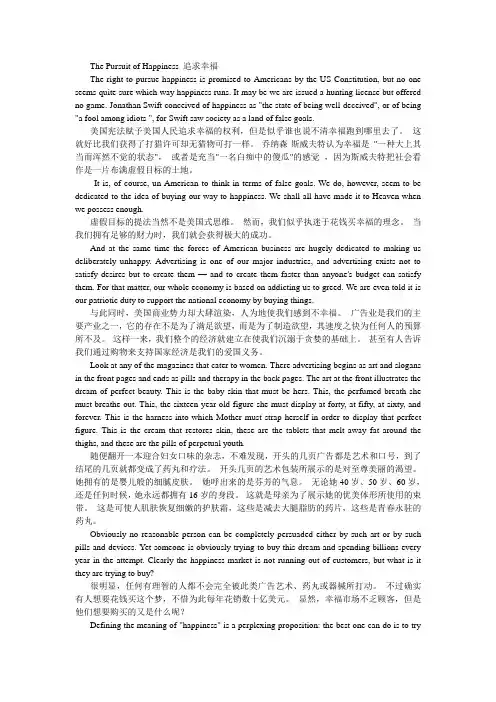
The Pursuit of Happiness 追求幸福The right to pursue happiness is promised to Americans by the US Constitution, but no one seems quite sure which way happiness runs. It may be we are issued a hunting license but offered no game. Jonathan Swift conceived of happiness as "the state of being well-deceived", or of being "a fool among idiots ", for Swift saw society as a land of false goals.美国宪法赋予美国人民追求幸福的权利,但是似乎谁也说不清幸福跑到哪里去了。
这就好比我们获得了打猎许可却无猎物可打一样。
乔纳森·斯威夫特认为幸福是"一种大上其当而浑然不觉的状态",或者是充当"一名白痴中的傻瓜"的感觉,因为斯威夫特把社会看作是一片布满虚假目标的土地。
It is, of course, un-American to think in terms of false goals. We do, however, seem to be dedicated to the idea of buying our way to happiness. We shall all have made it to Heaven when we possess enough.虚假目标的提法当然不是美国式思维。
然而,我们似乎执迷于花钱买幸福的理念。
当我们拥有足够的财力时,我们就会获得极大的成功。
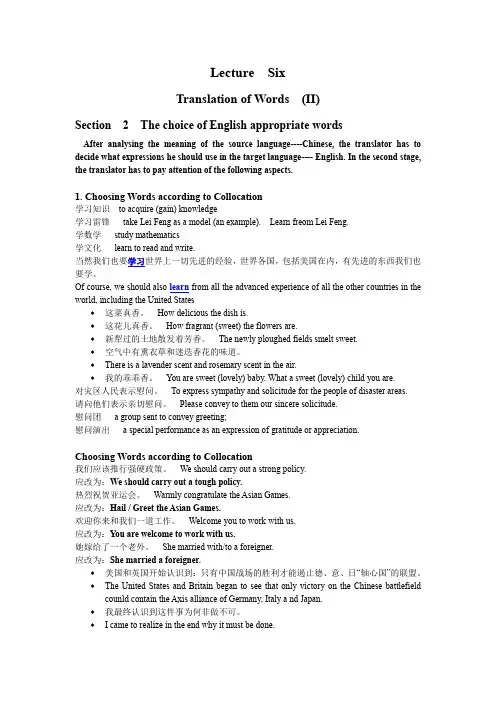
Lecture SixTranslation of Words (II)Section 2 The choice of English appropriate wordsAfter analysing the meaning of the source language----Chinese, the translator has to decide what expressions he should use in the target language---- English. In the second stage, the translator has to pay attention of the following aspects.1. Choosing Words according to Collocation学习知识to acquire (gain) knowledge学习雷锋take Lei Feng as a model (an example). Learn freom Lei Feng.学数学study mathematics学文化learn to read and write.当然我们也要学习世界上一切先进的经验,世界各国,包括美国在内,有先进的东西我们也要学。
Of course, we should also learn from all the advanced experience of all the other countries in the world, including the United States♦这菜真香。
How delicious the dish is.♦这花儿真香。
How fragrant (sweet) the flowers are.♦新犁过的土地散发着芳香。
The newly ploughed fields smelt sweet.♦空气中有熏衣草和迷迭香花的味道。
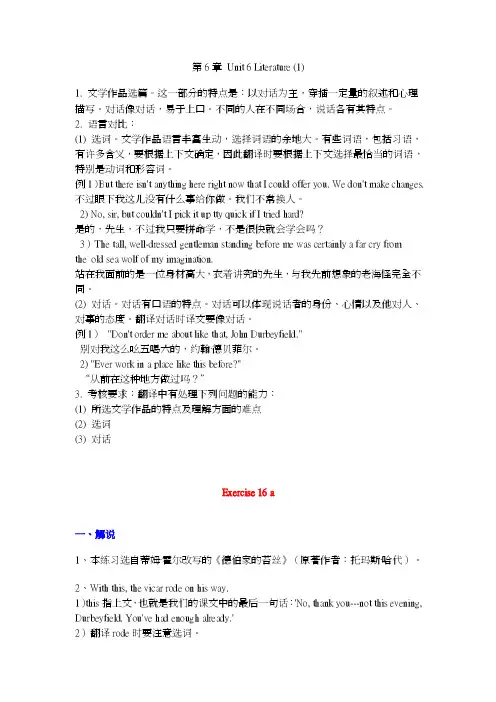
第6章Unit 6 Literature (1)1. 文学作品选篇。
这一部分的特点是:以对话为主,穿插一定量的叙述和心理描写。
对话像对话,易于上口。
不同的人在不同场合,说话各有其特点。
2. 语言对比:(1) 选词。
文学作品语言丰富生动,选择词语的余地大。
有些词语,包括习语,有许多含义,要根据上下文确定,因此翻译时要根据上下文选择最恰当的词语,特别是动词和形容词。
例1)But there isn't anything here right now that I could offer you. We don't make changes. 不过眼下我这儿没有什么事给你做。
我们不常换人。
2) No, sir, but couldn't I pick it up tty quick if I tried hard?是的,先生,不过我只要拼命学,不是很快就会学会吗?3)The tall, well-dressed gentleman standing before me was certainly a far cry fromthe old sea wolf of my imagination.站在我面前的是一位身材高大,衣着讲究的先生,与我先前想象的老海怪完全不同。
(2) 对话。
对话有口语的特点。
对话可以体现说话者的身份、心情以及他对人、对事的态度。
翻译对话时译文要像对话。
例1)"Don't order me about like that, John Durbeyfield."别对我这么吆五喝六的,约翰·德贝菲尔。
2) "Ever work in a place like this before?"“从前在这种地方做过吗?”3. 考核要求:翻译中有处理下列问题的能力:(1) 所选文学作品的特点及理解方面的难点(2) 选词(3) 对话Exercise 16 a一、解说1、本练习选自蒂姆·霍尔改写的《德伯家的苔丝》(原著作者:托玛斯·哈代)。

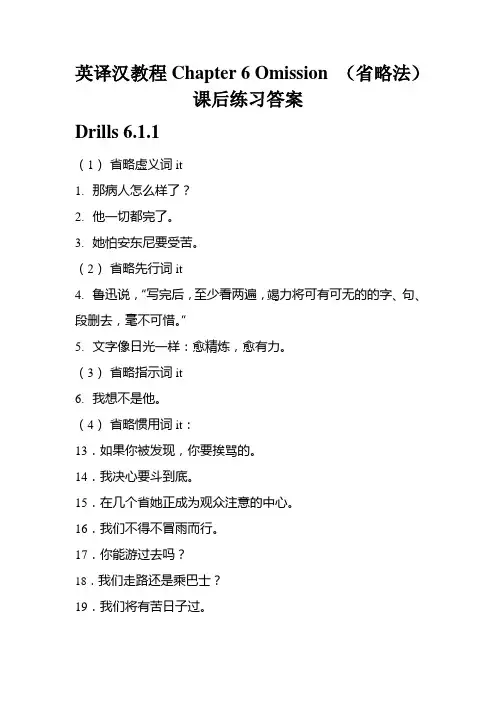
英译汉教程Chapter 6 Omission (省略法)课后练习答案Drills 6.1.1(1)省略虚义词it1.那病人怎么样了?2.他一切都完了。
3.她怕安东尼要受苦。
(2)省略先行词it4.鲁迅说,“写完后,至少看两遍,竭力将可有可无的的字、句、段删去,毫不可惜。
”5.文字像日光一样:愈精炼,愈有力。
(3)省略指示词it6.我想不是他。
(4)省略惯用词it:13.如果你被发现,你要挨骂的。
14.我决心要斗到底。
15.在几个省她正成为观众注意的中心。
16.我们不得不冒雨而行。
17.你能游过去吗?18.我们走路还是乘巴士?19.我们将有苦日子过。
(5)省略存在句中的补足词there:1.有志者事竟成。
2.有烟必有火。
无风不起浪3.有生命就有希望。
(6)省略惯用语中的补足词there:4.找事的人多于事。
僧多粥少。
5.有种种不同的朋友。
6.没有免费的午餐。
7.任何事情都无坦途。
8.难以预料他什么时候回来。
9.那事实不可能会认错。
那事实一清二楚。
10.他很固执,豪不变通。
11.有规则必有例外。
12.有烟必有火。
有利必有弊。
13.没有什么东西是一无用处的。
14.木已成舟。
为无法挽回的事忧伤是没有用的。
Drills 6.1.29.这是一套莎士比亚全集。
10.愿望为思想之父。
11.她与比尔结婚之前姓琼斯。
12.我想不起哪一年的圣诞节下过这样大的雪。
13.及时的小修补可免以后的大修补。
小洞不补,大洞叫苦。
14.一鸟在手,胜过二鸟在林。
多得不如现得。
15.从那天至今,哥伦布所发现的群岛一直叫做西印度群岛。
16.我们常常和布朗一家一起吃饭。
17.他喜欢毕加索的画。
18.你知道柯达牌照相机是哪里制造的吗?19.她有十分惊人的勇气,即从不怕说真话的勇气。
Drills 6.2.1(1)省略用作主语的代词;3.播什么,收什么。
种瓜得瓜,种豆得豆。
4.一年又365天。
5.十减四得六。
6.危险时也要保持冷静。
7.声波在空气中传播是看不见的。
Unit 6 Text AThe Green Bananait might have happened anywhere, my encounter with the green banana started on a steep mountain road in the central area of Brazil. My ancient jeep was straining up through beautiful countryside when the radiator began to leak, and I was ten miles from the nearest mechanic. The over-heated engine forced me to stop at the next village, which consisted of a small store and a few houses that we are scattered here and there. People came over to look. They could see three fine streams of hot water spouting from holes in the jacket of the radiator. "That's easy to fix, a man said. He sent a boy running for some green bananas. He patted me on the shoulder, assuring me that everything would work out. "Green bananas," he smiled. Everyone agreed.尽管这种事情在任何地方都可能发生,但我与青香蕉的邂逅却源自于巴西腹地一条险峻的山路上。
第六讲音译、直译&意译一、专有名词音译(约定俗成)1. 采用已有的、得到广泛认可的译名如:Milto n——Bernard Shaw——John King Fairbank——Conan Doyle——Top Gun——Yue Sai Kan——First National City Bank of New York——Cologne——Marlbor o——(Thomas Henry)Huxley/ 'hΛksli/, Aldous/'כldəs/——Midway Island——2. 汉化译名由原文家姓首音节与(常用)个人名的汉字译写形式构成的,姓前名后,其间不使用间隔号。
A. Matteo Mattbien Ricci:B. Timothy Richard:C. Agnes Smedley:D. Charles Elliot:E. 由另取的汉姓与原文(常用)个人名的音译形式构成译名,如:Johann Adam Schall von Bell:F. 由原文家姓首音节的音译形式与另取的汉名构成的译名,如:Julian Schumanne:G. 音译+意译:Pearl S. Buck:H. Malacca Strait:I. Hiroshima:3. 其他(人名、地名、商品名、名胜古迹等)纯音译/ 直接音译A.bikini:B.karaoke:C. McDonald’s:D.Poker:E.lymph:F.aspirin:G.El Nino:H.Algeria:✧采用表意性很强的汉字,即加形符,给人提供了从形到意的识别通道,符合汉文化以形表意的构词传统,或所选用的字往往同原词的所所指意义有联系,或在翻译时外加一些褒贬之意。
这类音译词符合汉语习惯,让中国人很快能接受。
(这类音译词实际上音义兼译词有重叠的部分,但不完全重合。
)如:ballet: ;vitamin: ; humor: ;shampoo: ;Maya:Benz: ;Citizen: ;Contac: Quic:◆◆◆初学翻译者应学会译好工具书上查不到的地名。